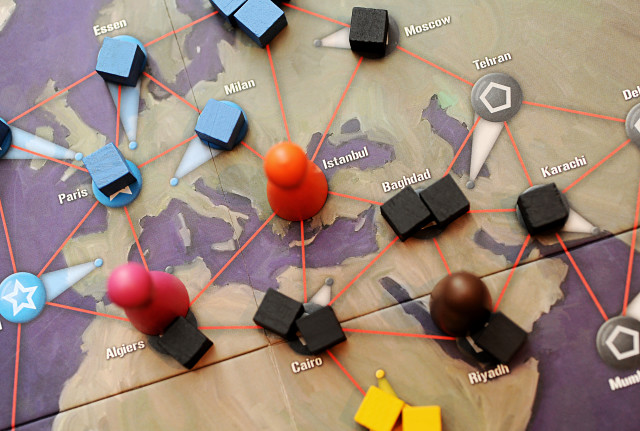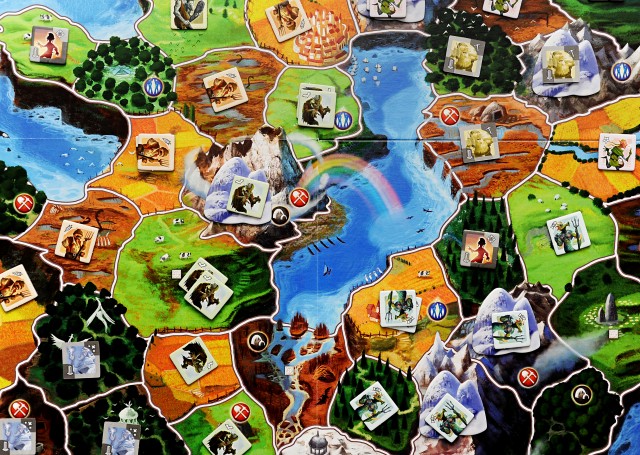Someone asked me the other day whether I thought an alien power in Cosmic Encounter was too strong, and that got me wondering about player powers in games in general.
Individual player powers have been around in games for a while now. Have you played Cosmic Encounter, Stockpile, Pandemic, 7 Wonders, or Small World? All of these feature a variable player power for each player at the table, and whether you recognize it in yourself or not, that power will have some impact on how your game is played.
My question for today is how far does the rule alteration of a power dig into the gameplay, and how far should it go? Is there a limit? Let’s start by examining the two broad types I am looking at in this article.

If I am playing Tokaido or Dead of Winter, I will have a character or characters with something that offers them a way of being more effective at something specific in the game. I might be able to draw an extra card from a deck, for example, and choose which of the ones I drew to discard, rather than having a single choice.
This, to my eye, is very much a guide. If I can get to that hot spring in Tokaido and draw a bonus card, that would be wonderful. If we desperately need to search the School for that specific item in Dead of Winter, I will be the first to volunteer to go there, so that I can grind through the deck more effectively (unless I’m a sneaky traitor!). However, if someone else has already done that and blocked the space or found the card, that is fine – I will go somewhere else and do something different.
The opposite extreme of these games would be something like Cosmic Encounter. If I am playing the Pacifist, then I am significantly more likely to use Negotiate cards in my battles, because I can use my power to win that battle, even if my opponent lies and stabs me in the back. If I draw the Filch flare, allowing the player to cheat legally as long as they are not caught doing it, you’d better believe I’m going to try to cheat throughout the whole game (and, with my luck, get caught on my first attempt!).

In Pandemic, if I am the medic and I can see a city with three cubes in it and there’s a chance it will outbreak, I will absolutely be planning a route there. Is this still a guide, or is it starting to impact gameplay to a point where your power is telling you how to play instead of suggesting it? If it is more of a how to play scenario, is that a “bad” thing?
Personally, I say no, though that is, of course entirely a matter of opinion. I enjoy games that are different each time I play them. A new challenge is presented when you work with different rules and abilities, and that keeps gameplay fresh.
I recently played a game of Forbidden Desert where I pointedly excluded the water carrier from the character draw, because I had always taken them given the chance. I played completely differently – I was more aware of water, less cavalier in splitting the party without needing to, and completely unsuccessful in winning the game.
While that might be down to bad luck with my card draws, I definitely felt as though my input into the game had changed, and that directly affected how the game went for me. I could have begun by playing exactly the same moves I had used in the game before, and I would have hit a point a few moves in when continuing that repetition would have been tantamount to suicide for my characters, so I changed gears and played differently.
I do find, with situations like this, that I wonder if I have become reliant on a specific character or power within the game in order to be good at it, but that usually encourages me to explore other routes. Win or lose, that is guaranteed to be an experience I haven’t had before.
 With abstracts – particularly tile-placement games – I find myself all too often following the path that I know, or doing whatever won me the game the last time I won it – I’m particularly guilty of this with Splendor – and while that does not diminish my base enjoyment of a game, it will probably not stay in my current repertoire for as long.
With abstracts – particularly tile-placement games – I find myself all too often following the path that I know, or doing whatever won me the game the last time I won it – I’m particularly guilty of this with Splendor – and while that does not diminish my base enjoyment of a game, it will probably not stay in my current repertoire for as long.
To come back to topic, I find that the more intriguing observation I have made with regards to player powers comes down to how they affect the other players. In a game where powers are very strong, I find players reacting to how far someone is in the lead. Alliances will be formed against the player who already has four planets in Cosmic Encounter, with the goal of ensuring that they don’t get that fifth one they need to win the game – at least until someone else gets there!
In my experience, in a game with more subtle player powers that allow small benefits instead of large changes, players are more likely to try to shut down another player’s power by stopping them from accessing it. In Tokaido, I have frequently seen players decide to take a space and comment that it prevents someone else from getting there and using their power.
This could also be a greater likelihood in worker placement games, since I have noticed similar behaviour in Twilight Imperium 3rd Edition as well, but that then raises another consideration: does the core mechanic of a game adjust how influential player powers are, or how strong a certain ability is? Almost certainly, yes. Does the shape, layout, size and accessibility of the game board do the same? Absolutely.
If I could draw additional infection cards every other turn in Pandemic and decide which ones would take effect, potentially avoiding an outbreak altogether, that ability becomes exponentially more powerful than it is in Tokaido, where it might only make the difference between me getting two or three points in a sixty-plus point game – an advantage, of course, but a minor one in the grand scheme of things, unless I can make it work one hundred percent of the time.
I think that the scale, impact and controversial nature of player powers is entirely dependent upon balance, and that is what matters. It just so happens that the total imbalance of the player powers in Cosmic Encounter is exactly what balances it – or at least gets the scales most of the way there – but I think that only works because the game is mostly player negotiation.
 Small World is the final example I will discuss. A game like this has an inherent challenge because each player has two individual powers based upon the race and trait cards that come up at any given time. Some of these combinations can be very powerful, either both having a similar effect, for double the payoff, or supporting each other in a very symbiotic way. Others might seem a little less cohesive. However, I find that the recycling effect in Small World that occurs when a race is sent into decline is a very effective tool, since it can allow you to abandon a strategy that is giving you trouble and move onto the next one.
Small World is the final example I will discuss. A game like this has an inherent challenge because each player has two individual powers based upon the race and trait cards that come up at any given time. Some of these combinations can be very powerful, either both having a similar effect, for double the payoff, or supporting each other in a very symbiotic way. Others might seem a little less cohesive. However, I find that the recycling effect in Small World that occurs when a race is sent into decline is a very effective tool, since it can allow you to abandon a strategy that is giving you trouble and move onto the next one.
I believe that this discussion hinges on the accessibility of the player powers. I recently had a conversation in which someone commented that the player using the Rusviet Union tends to win at Scythe, but that’s because the Russian player power is the most accessible, while others take understanding, practice and trial and error. The alien power in question in the Cosmic Encounter debate that sparked this article was from one of the game’s aliens that is rated harder to use, and so the power itself required more study, and had obviously been used well by the player who controlled it.
It is the fine-tuning and understanding of the development of a game that defines whether powers are good and well-balanced or not, at least in my view. Whether they guide you, lead you or otherwise doesn’t matter to this particular gamer, and while there are some great games out there that have a couple of objectively more powerful powers, I do believe that they are in the minority.
Another cool benefit of players powers is subtly handicapping better players. When teaching Tokaido to new players I often choose a weaker character because it helps even the playing field without anyone openly “slow playing.”
The game is still fun for me because I am trying to pilot a poor character to victory, and the weaker/newer player doesn’t feel like I am handing them the game.
That’s a really excellent idea! -Nicole